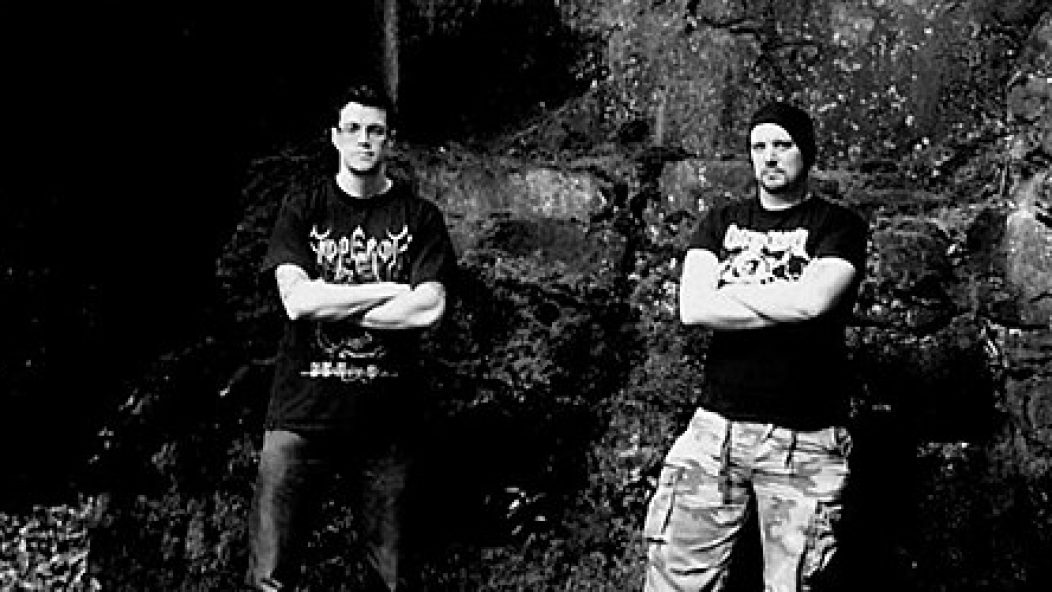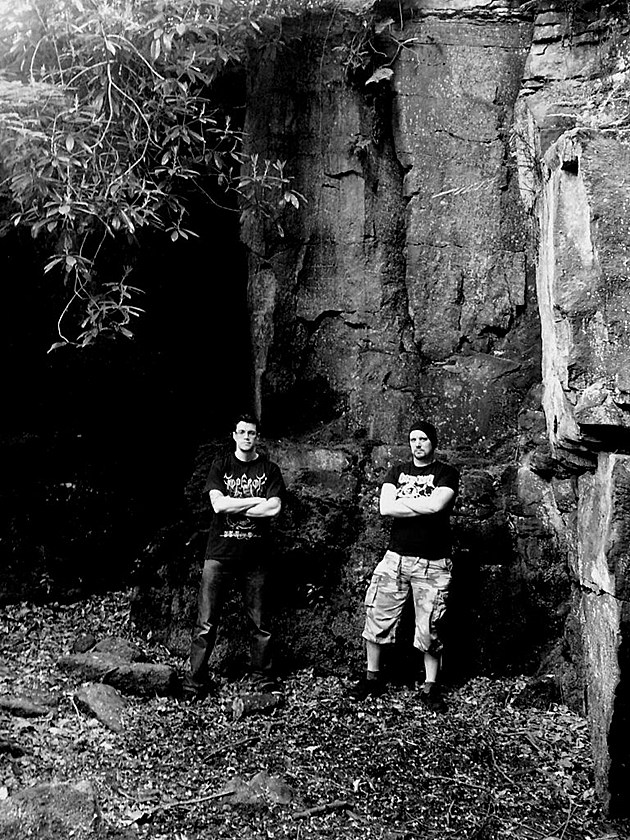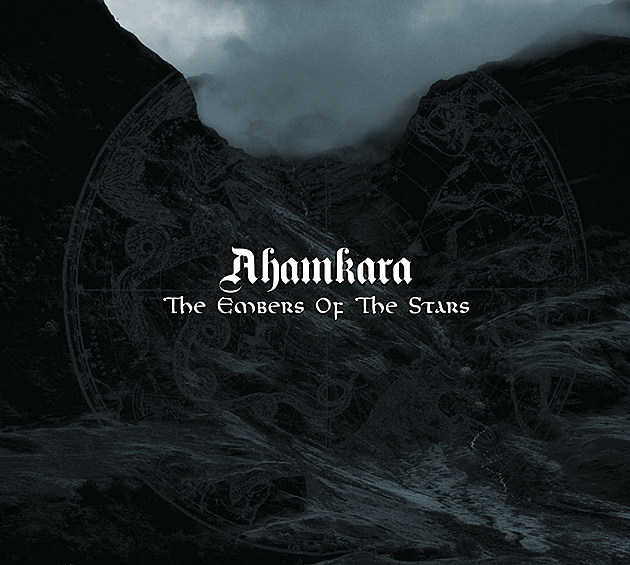
Ahamkara - The Embers of the Stars (Interview & Album Stream)
…
UK atmospheric black metal duo Ahamkara have an appeal that is difficult to put into words. In the interview to follow, multi-instrumentalist Michale Blenkarn (also of Wodensthrone and ex-The Axis of Perdition, not to mention several other bands) describes the band’s first album, The Embers of the Stars as “elemental.” It’s an apt description, but not in the sense that the band’s music evokes natural landscapes—Ahamkara is more invested in our inner psychic geography, though (more on that below). Further, the group’s compositional approach is easily picked apart. Most atmospheric black metal groups cram all of the vocals, synths, bass and guitar into a reverb-drenched midrange until the music tastes like lukewarm broth. That’s great if you have a cold, but Ahamkara is heartier, with easily differentiated guitar, bass and especially keyboard lines, each floating around and ricocheting off one another like chunks of vegetables and meat in a stew—only vocalist Steve Black remains obscure in the middle.
Blenkarn proved himself a thoughtful and intellectual composer in our interview, speaking candidly about his place (or lack thereof) in the UK’s blossoming black metal scene, his work in other projects, and the difficulty of being a left-handed guitarist. Mostly, though, he’s interested in Ahamkara, treating the band more like an existentialist thought experiment than an exercise in Emperor worship.
The Embers of the Stars is available now from Nordvis in Europe and will be available on February 23 from Bindrune in the US, putting Ahamkara in the esteemed company of Panopticon and Falls of Rauros. We’re streaming the full album below. give it a listen while reading Blenkarn’s extended and thoughtful responses.
…
…
Ahamkara is a relatively new project. Would you tell me the story of how the band began, and how the music was written? Alone or as a duo?
It’s difficult to pinpoint when Ahamkara started; the waters are muddied by the other bands I’m involved in. At some point a number of complementary musical ideas accreted naturally together and much to my own surprise I had something new on my hands. Psychologically it continues many of the fundamental threads that I explored in The Axis of Perdition—psychogeography, the fundamentals of the self and the psyche, the evocation of world through sound—but obviously through a very different lens.
Steve joined the band at a point where the album was taking the shape it has now; it took his involvement and intervention to complete the band’s character and where this material was concerned, to hammer it into the best shape it could be, to dot the I’s and cross the T’s. Moving forward, as the sole instrumentalist at this time I’m doing the majority of the compositional legwork; Steve provides essential perspective, editorial finessing, not to mention stopping me from tinkering with the material indefinitely. At present I’m still doing bits and bobs of the lyrics, mostly because I still have a few bees in my bonnet, but as time goes on the words should become Steve’s exclusive preserve.
In the context of the projects I’ve been part of in the past, I think it’s very audible in this album that I was eager to start a fresh page and so the music has a very establishing character—as the project emerged, I took pains to avoid complication and work with simple and expressive ideas. I was very conscious of how debut releases create the entire context for a band’s work so I was quite meticulous in establishing certain compositional precedents, not least a core of focused simplicity, in which future efforts can be situated; a heart to which Ahamkara always has the option of returning to. I was keenly aware through TAOP’s career that our debut album The Ichneumon Method (fond as I am of it) generated a lot of misconceptions and frictions about what that band could or should do, purely through lack of discipline and definition on our part. Therefore the key word to describe the approach on The Embers of the Stars is “elemental”; wherever we go from here, this album is Ahamkara’s DNA.
Ahamkara means the inner self, or “I” in Hindu metaphysics. Is that the meaning that you had in mind when you named your project this? If so, why, because it seems unusual for a British band to adopt another cultural object such as that name and concept.
The sense of Ahamkara that we’re referring to specifically is that of identifying the self within an externalised work, in this case a body of music. It signifies a total conscious investment and actualisation of our “selves” in what we create. In Hindu terms this is actually a sin or act of hubris and therefore an impediment to achieving enlightenment but I do think the concept overall, stripped of these pejorative undertones, neatly expresses what we’re trying to do. Philosophically speaking Ahamkara is founded on a fundamentally empiricist/existentialist worldview so it’s not really relevant to us to identify with any sense of “Britishness,” cultural or otherwise.
You’re perhaps more well known for your work in The Axis of Perdition, but in that group you played keyboards. you also played keys in Wodensthrone. Do you compose primarily on the keys?
Not at all, I have terrible trouble composing on synth first when it comes to metal—it’s just not the instrument for it! I’m primarily a guitarist so everything I write is essentially guitar-orientated. It’s odd that a lot of internet sites report me as TAOP’s keyboard player in the first instance as I wrote and performed most of the guitars for that band—I assume the fact that I play synth in Wodensthrone now has possibly skewed people’s perceptions a bit, especially as in TAOP we were much more enthusiastic about making daft quips in our liner notes than documenting who actually did what. I think the synths I do in Wodensthrone are also shaped by the fact that I’m a guitarist first—it’s very important to me that the guitars take centre stage and that I work around them rather than vice versa, which saves us from having the sort of ego clashes that a lot of other bands have!
…
…
They say that if you can play piano that the skills involved are transferrable to any other instrument, do you think that’s true?
I guess so. Certainly having got to grips with one instrument must have a positive impact on the learning curve with other instruments, at least in theory. I started off with piano at school before I picked up guitar and I think that actually catalysed me making a bit of an error of judgement at that time as the fact that I had that division in my head of the right hand doing the fiddly details and the left hand doing the supportive stuff skewed me towards playing the guitar the left-handed way (though I’m sure being left-handed also helped!). Unfortunately I didn’t realise at the time that left-handed guitars are much scarcer, more expensive and limited in options otherwise I would have made the extra effort to learn the sensible way round. I’m currently playing on a right-handed Ibanez that I inherited from Brooke (TAOP’s other founder member) with the strings on upside down and the pickup reversed; it’s ok for recording and I muddle through, but it’s frustrating.
You’re from north Yorkshire (where Scarborough is!) yes? At least that’s where The Axis of Perdition was based. Black metal of this sort is often seemingly inspired by its surroundings. What effect does the environment you live in have on you?
Yes, I’m from Middlesbrough in Teesside, which is just at the top-right-hand corner of North Yorkshire (we occasionally went to Scarborough in the summer when I was little) and I now live in a little commuter town just north of Newcastle. Environment has always had a very deep and complex effect on me; the Tees Valley area is a place of vivid and startling contrasts, with the mouldering dystopian mass of Middlesbrough itself and its surrounding industrial sprawl on one hand and picturesque and even breathtaking countryside on the other. The effect of that is that I feel I can only respond to the psychogeography of my surroundings by accounting for one side at a time—which is how I ended up spending 10 years doing music immersed in a Grand Guignol caricature of the area’s most polluted/pollutive and dysfunctional urban excesses. Ahamkara is similarly shaped by landscapes that I have experienced directly and viscerally, but it allows me to show the side of my character that I’d creatively suppressed for a long time. As stated previously, I approach this landscape in an empiricist/existentialist way—it’s about what I’ve experienced for myself as an individual, accounted for in my own terms, making a deliberate effort to eschew the materials of shared culture (e.g. tradition or broader socio-cultural identity).
Likewise, the UK has produced a lot of interesting music that seems akin to what you’re doing in Ahamkara, such as Saor and Winterfylleth. Is there a tight-knit scene in the UK that supports this kind of music? Also, is it true that the UK is developing its own black metal identity distinct from that in Norway and America? If so what sets it apart to you, as an insider?
This scene certainly feels more inclusive than it did in the earlier days of TAOP, but I still feel that our bands work best when developing in isolation, even if it’s self-imposed. Something that I think is done well in this country is idiosyncratic and eccentric approaches to black metal—A Forest of Stars being a great example. As result of this and my experience with TAOP I’ve always felt deeply skeptical whenever journalists, individuals or other musicians suggest that broader movements or currents are at work. However it is undeniable that we see more of each other and interact a lot more, though I think there’s a difference between being able to get along socially as people versus any audible manifestation of camaraderie. Personally speaking, and on behalf of Ahamkara generally, I feel much stronger bonds with the Bindrune family of bands, most of whom of course are from the States and who—deliberately or otherwise—may share our sense of dislocation from the kinds of socio-cultural tradition that many European bands happily saturate their music with, in favor of something more personal, introspective and uncanny. It’s strictly my preference (as I’m quick to qualify; I can think of few things more tedious than quibbling over the etymology of black metal with anyone) I would much rather listen to a black metal band engage in their music with this kind of individualized esotericism—I think it lends the music more depth and authenticity than simply applying a well-established iconography such as Satanism. It’s the same sort of process at work that makes an artist like David Tibet/Current 93 so compelling, regardless of whether you agree with him or not.
Unlike those bands, however, your music is sort of colorful. The keys are prominent and obviously synthesized, not trying to sound like other instruments. What was behind that creative decision?
When it comes to synths, just using them to emulate other instruments is only scratching the surface of the possibilities available. When it comes to Ahamkara my synth approach is heavily modelled on dark ambient artists like Raison D’etre, Kammarheit, Desiderii Marginis, Svartsinn, Northaunt, etc. There’s a particular atmosphere you can cultivate with that sort of pad-heavy approach that appeals to my imagination much more than the average “symphonic” approach. The more dreamlike quality of these sounds also help symbolically to articulate Ahamkara’s turn away from cultural/spiritual tradition by eschewing clearly identifiable “symphonic instruments”, their associations and behaviours. Wodensthrone is obviously a different kettle of fish!
…
…
That colorfulness is true of the artwork as well, there’s lots of blues and green. What’s the deal with the cover art?
Honestly, there’s not much of a story to the artwork; the oversaturated/filtered colours are to lend it a hyperreal/dreamlike quality that complements the music. The medieval star chart has obvious glyphic value given the album title; I also found it aesthetically pleasing and the integration of a circular symbol is also a bit of a nod to the cover to The Pagan Prosperity by Old Man’s Child, which I’ve always been very fond of for one reason or another. There are two slightly different versions of the cover doing the rounds; this is purely because the original version wasn’t hi-res enough for physical pressing so I had to reconstruct it (I consider this second version to be the definitive one).
Your vocals are pretty incoherent, so what are the lyrical bents that you explore? I remember that The Axis of Perdition did a lot of work about the game series Silent Hill, but Wodensthrone was more rooted in traditional Norse heathenry and mythology.
Ahamkara is about exploring the psychology of the self, of spirituality; expressing our selves strictly through the lenses of what we ourselves have viscerally experienced. We apply this principle in an almost ascetic way, striving to create music that is mythopoeic rather than informed by pre-existing myth. In this respect we are constantly seeking to evoke the “Unheimlich,” that indefinable quality of Otherness, veiling our experiences and meditations within dreamlike narrative forms that both fulfil our need of expressing ourselves while posing the listener an enigma to unravel; and by the internalising process of interpretation, to make their own. We are constantly coming back to the issue of individual experience; this deliberately mystifying methodology allows us to feel satisfied that we have achieved our own ends while giving each listener as much space as we can to define their own permutation.
TAOP was inspired by urban decay and psychological horror in general, including not just Silent Hill but also authors such as Ramsey Campbell, films like Session 9 and urban exploration/field recording and post-TG industrial culture. I think it was very silly of us to cite the mythos of Silent Hill so brazenly and harvest samples from the series so heavily on the Physical Illucinations… EP from 2003. That idolatry was a passing infatuation but we ended up being pigeonholed in the bracket for the rest of the band’s lifespan—we can only blame ourselves for that. The Urfe/Tenements trilogy we did was an attempt to move on from that and articulate our own mythos more clearly, but the effort of achieving that and our dissatisfaction with the results—and let me be clear that here I mean dissatisfaction the technical execution of the recorded documents (mixing and mastering mainly), not with any of the material as written – was a big factor in finishing the band off for good.
While I only joined Wodensthrone after Loss had been recorded, I think I’m integrated into the band enough now to state categorically that our lyrics interrogate heathenism, tradition, history and shared culture quite fiercely in an attempt to make the ignominies of the modern world more intelligible and learn from the mistakes of the past and present. In contrast to Ahamkara’s almost solipsistic introversion and obsession with the minutiae of the self, Wodensthrone addresses the idea of shared spirituality and culture and our capacity to communicate meaning effectively to each other and co-exist pragmatically, grounded very much in a contemporary heathen sense of ethics that expresses our own choices about the lives we live through the lens of classicist archetypes.
…
…
What is your goal, as a musician, with this project. Is it a one-off or something that you’re going to focus on?
Ahamkara is as personal and important to me as TAOP was, just with a totally different end result, and will continue as such. I love playing in Wodensthrone as it’s a different way of being involved in music and the creative process; however there is a part of me that will always be a bedroom megalomaniac and in Ahamkara, Steve both allows me to indulge that and provides the essential functions of quality control, doing all the things I can’t do and generally keeping a lid on my excesses.
What about playing live?
At the moment it’s not logistically viable for us, for a number of reasons too boring to go into here, but we would love to have the opportunity at some point. I might have to buy a guitar that’s the right way up, though…
…












